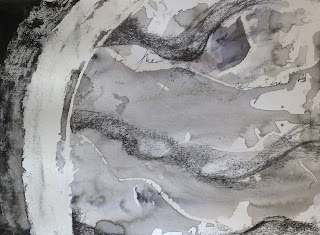Beat the bounds
and know the paths
redeem the space
where blood run
where blood pools
within, without
the boundaries that broader
the boundaries unmoved
[For full chapter, click here
This chapter continues expanding up the key words that appeared in the previous one: k'r'v--within, amongs; d'r'sh, investigate, analyze. Now, two new leitworts enters: g'v'l--boundary, border; and d'r'kh--path, road. We at last speak of the definitive boundaries that create the sacred space "within" and the roads that form the interconnections. These preservation of these boundaries requires taking responsibility on the most primal level: a care for spilled "blood," for perjury, and a constant maintenance of the sacred space within: "you must burn out the the clean blood within" in a continuous re-calibration. There must be a "redeemer of the blood" (go'el ha-dam). Even if inadvertent, any act of killing is "murder" and demands a complex play of redemption and refuge.
The return to Sinai in the previous chapter also returns us to the laws given in the aftermath of Sinai: "He that hits a man and dies shall be put to death; but if he did not lie in wait, but God brought it to his hand, I shall appoint a place where he shall flee" (Exodus 21: 12-13). These laws are reiterated in this chapter, but now grounded in the earth "which you are about to enter." Characteristically for Deuteronomy, the laws are now focused on humanity rather than on God: "designate for yourself three cities within your land."
And it is only in taking this responsibility that the land will truly become "yours." The chapter open by emphasizing that the land does not yet truly belong to Israel: "when God shall cut off the nations whose land God your Lord is giving to you...and you dwell in their cities and in their houses." Only after taking responsibility for inadvertent murder does that land become Israel's: "You shall separate three cities in the midst of your land, which God gave you to posses."
In taking this responsibility, one can even change and move the seemingly immutable outer boundary. Boundaries are perhaps absolute on a personal level-- "do not encroach on the boundary of your brother, which the early ones have bound"--but on a national level, the are flexible, expanding to fit the nation's commitments: ": "If God your Lord expand your border...designate another three cities of refuge." ]



